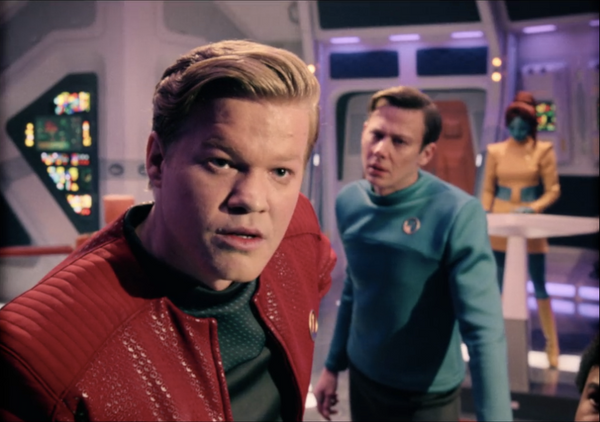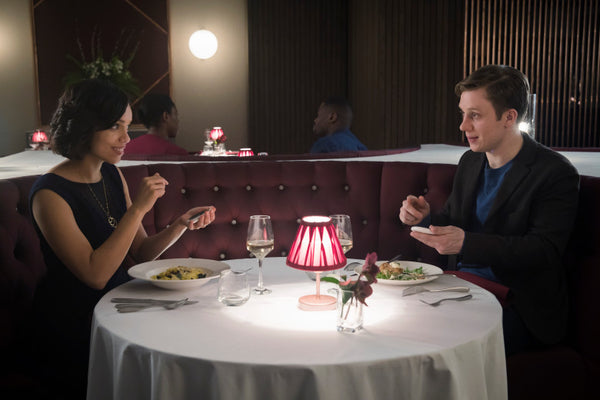Who Wrote the Algorithm of Love? - Why we're all terrible people for loving Hang the DJ
Warning: If you haven't seen the entirety of season 4 of Black Mirror, turn back now. Here be spoilers aplenty.

Back in September Charlie Brooker accepted the Emmy Award for Outstanding Television Movie for San Junipero. It was one of the few moments of 2017 that brought me pure joy, not to be outdone of course by the first time I watched the Black Mirror episode a few months previous and had to physically remove myself from my sitting room so I could ugly-cry into a pile of pillows. San Junipero’s win at the Emmys felt like a small hopeful triumph in the midst of a very bleak year. But as Brooker and producer Annabel Jones have taught us time and time again, we can never be complacent. We must continue to question and ask “what if,” even of stories and concepts we love.
The recurring theme throughout season 4 of Black Mirror uses the idea at the centre of San Junipero - transferring and storing human consciousness - to disassemble and examine the concept of love itself. It asks why we love the people we love and how do we express it? Is love ultimately selfless or selfish or perhaps both?
This plays out beautifully in the episodes that revolve around the relationships between parents and their children. In Arkangel we see a mother, desperate to shield her only daughter from harm, using an app-controlled implant to literally filter out any disturbing visuals or sounds. As expected this ultimately comes with tragic consequences. Conflict arises in USS Callister when it is revealed that one of the long-suffering crew members of a simulated space adventure game refuses to mutiny against their emotionally stunted, tyrannical captain in order to protect his 6-year-old son from being copied into the game and killed over and over again. His decision in the end, to suffer a most painful fate to save his son and fellow simulated crew members, is one of the most touching moments of the season.

Within most of the season the warning is loud and clear: beware the consequences of nuerotechnology. However the warning from one episode very much came from the audience’s reaction to it. Acting as a buffer between 2 very violent episodes and nestled in exactly the same point in the season as San Junipero, Hang the DJ is season 4’s romantic love story. On the surface it’s sexy, funny, and hopeful. I watched it on New Year’s Eve, alone and single in my bedroom with a cup of tea, and it filled me with the same warm fuzzies as it did with most everyone. Despite not believing in the idea that there is 1 person out there that we are meant to be with, I felt a sickly sweet yearning for the kind of love that makes you want to leave everything you’ve ever known behind and scale a 1000ft wall in a dress.

In the other episodes it’s much easier to make a moral judgement call or at least see where the characters made misguided choices: Rolo Haynes in “Black Museum” was a corrupt scumbag of the highest order; Mia in “Crocodile,” while attempting to save her family from being torn apart by past decisions, violently destroys someone else’s; Bella in “Metalhead” risks her life in an attempt to retrieve a host to store her child’s consciousness in.
Side note: Kudos to Brooker for making us all terrified of those robotic animals we all found so fun and cute on Youtube.
But because we’re so in love with love, with the promise that we can defeat the system by finding that 1 true person out of 7 billion that we’re meant to be with, we’re somehow able to ignore and even celebrate the fact that the protagonists killed 1000 sentient versions of themselves for the sake of 1 date. They made them live 1000’s of years worth of repeated heartache, breakups, joy, misery, monotony, good sex, bad sex, the works all on their behalf so that they could rely on an algorithm and not have to go through all those experiences themselves. No their deaths may not have been violent ones, but all those copies of Frank and Amy were essentially farmed for their emotional data and disposed of when the system got what it needed.
The thing about love, in all its forms, is that it is dependent on personal growth to succeed. It is challenging at the best of times. To be a good partner to someone is to bring all the wonderful things about yourself and your experiences to the table and to have learned from past mistakes. Love is making compromises and supporting one another. The tragedy is that the Frank and Amy copies learned that for themselves and were deleted out of existence before they could spend their lives together, while the original Frank and Amy are presumably ignorant as to why they make a 99.8% match in the first place. We reflect that ignorance when we watch something like Hang the DJ and not think about the ethics at the heart of it, whilst judging other characters in the series for making similar choices.
Hang the DJ isn’t my favourite episode of the series, but of all of them it is the one that kept me up late on New Years Eve questioning my own feelings and emotional response and wondering: “if I had the opportunity to sacrifice myself 1000 fold for a gamble on love, would I?”
Touché, Brooker. Touché.
